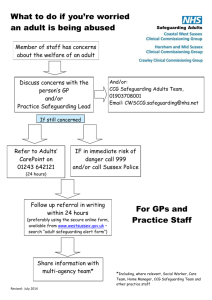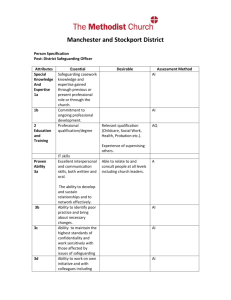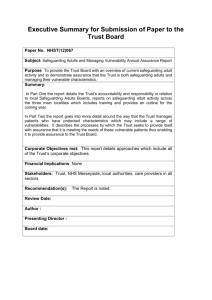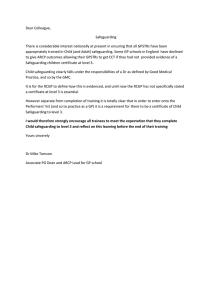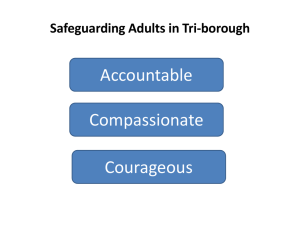Safeguarding Policy Sybil Elgar School
advertisement
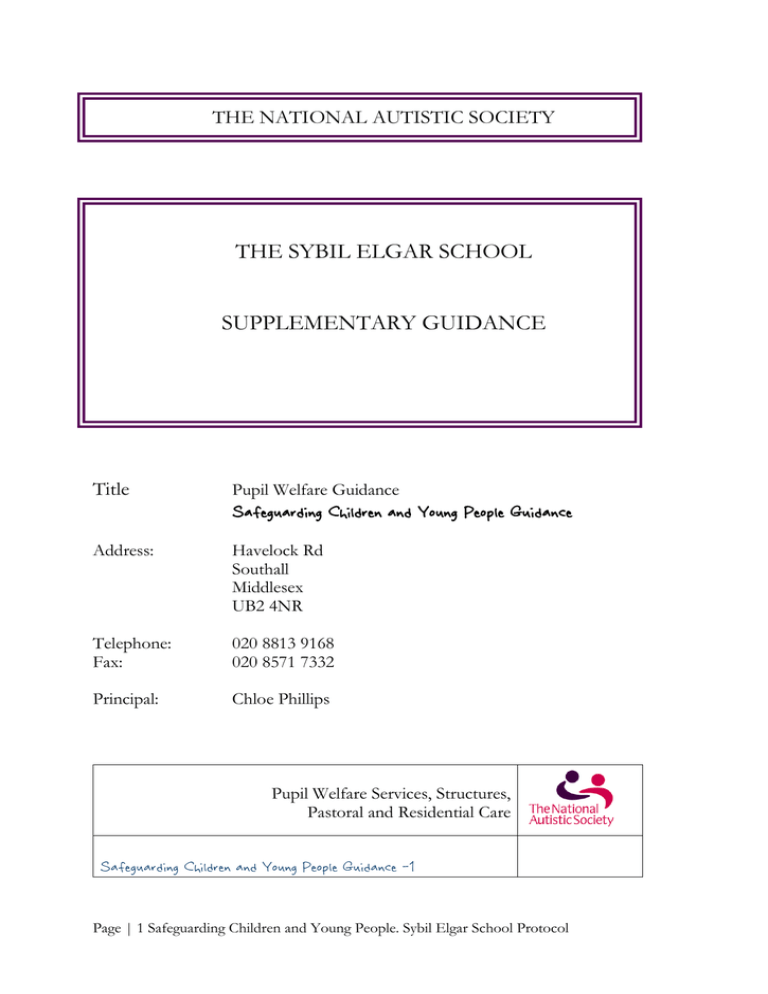
THE NATIONAL AUTISTIC SOCIETY THE SYBIL ELGAR SCHOOL SUPPLEMENTARY GUIDANCE Title Pupil Welfare Guidance Address: Havelock Rd Southall Middlesex UB2 4NR Telephone: Fax: 020 8813 9168 020 8571 7332 Principal: Chloe Phillips Safeguarding Children and Young People Guidance Pupil Welfare Services, Structures, Pastoral and Residential Care Safeguarding Children and Young People Guidance -1 Page | 1 Safeguarding Children and Young People. Sybil Elgar School Protocol Safeguarding Children and Young People Supplementary Guidance This guidance is to be read in conjunction with the NAS Safeguarding Children Policy, SO-0189. The purpose of this document is to further outline the specific procedures and systems that are in place at The Sybil Elgar School which serve to safeguard, to both promote the welfare of children and young people and to protect them from actual and suspected abuse. Our prime concern is always the interests and safety of our children and young people. In urgent situations, which involve the immediate risk of significant harm it is essential to take immediate action to ensure that pupils are safe and cared for, such as phoning the emergency services. ‘The welfare of the child is paramount’. Children Act 1989. It is the responsibility of all staff, whether paid or unpaid, working at the Sybil Elgar School to safeguard and promote the welfare of our children and young people. Responses to concerns of abuse On every occasion that any member of staff has reason to suspect that a child or young person has suffered abuse or is at risk of suffering abuse the Designated Senior Person (DSP) for Child Protection must be contacted as soon as possible. Lucy Burholt is the DSP for Child Protection at the Sybil Elgar School. In her absence the team leader or senior member of staff on duty who has been delegated this responsibility on each site should be informed as soon as possible. You can also contact Sybil Elgar School’s Designated Senior Person (DSP) for Child Protection if you need any further guidance about safeguarding. The DSP works closely with the Registered Manager on all matters concerning the wellbeing and safety of children and young people who live in and attend the Sybil Elgar House. Roles and Contact details are attached at the end of this document and are also available on notice boards, in newsletters, on our website, in Induction Books and as a handout during staff training Staff, children and young people, families, visitors can talk in confidence to the DSP about any concerns that they may have about a child, or about any practice that they feel uncomfortable with. Whistle blowing is actively encouraged at Sybil Elgar. The DSP will always prioritise her workload to be available for matters about wellbeing and safeguarding. Discussions are followed as soon as possible by a written report in the ‘Cause For Concern’ book. Some examples of entries in the Cause For Concern book include, though not exclusively: Any marks, injuries, etc., however minor, where the cause is unknown Any significant injuries, such as fractures, burns, poisoning, amputations, etc. Any marks that are on suspicious parts of the body, such as genitals, soles of feet, backs of knees, etc. Any marks that indicate an instrument may be involved, such as ropes, belts, square marks, etc. Page | 2 Safeguarding Children and Young People. Sybil Elgar School Protocol Any disclosures by the child, young person, carers, family, Social Worker, public, etc. Missing or absconding child or young person, including repeated or prolonged absences Any signs of radicalisation or extremism Bullying Breaches of e-safety systems Low level recurring incidents or behaviours Any signs of neglect or that a child or young person’s human rights are not being upheld This book is locked in a secure office and can only be retrieved by the DSP, Principal or the senior with delegated responsibility. Staff will be supported to ensure that all the pertinent information is included, such as dates, times, witnesses, precursors, locations, history, etc. It is not the DSP’s role to investigate, rather to ensure that an accurate description of the facts is gathered. The DSP may need to see the child or to see all contiguous records as soon as a referral is made. The safety and wellbeing of the child or young person will always be the guiding factor for any actions. Provisional actions may be recorded and agreed at this point, especially those referring to the immediate wellbeing of the child. Staff must on no account make physical examinations or pursue enquiries beyond the initial statement and guidance of the DSP or Senior. The information shared needs to be kept confidential and on a need to know basis. There is supplemental information in the front of the Cause For Concern Book to support both the member of staff and the Senior with designated responsibility complete entries competently and to understand the protocol and to respond appropriately. Having been informed of a concern, the DSP will confer with the Principal as appropriate and together as needed and will agree about any immediate actions needed to safeguard the child, what information to initially gather and identifying who will be responsible for sharing what information with whom. Family will be informed as soon as is possible. Staff should not contact families directly unless as an agreed action, logged in the ‘Cause For Concern’ book. The DSP will make initial judgements about whether the concern raised meets any thresholds for safeguarding and will act accordingly in a timely matter. She is guided in these decisions through conferring with the Principal, her knowledge and experience of safeguarding and her knowledge of the individual children and young people. See ‘Ealing’s Assessment Protocol & Thresholds of Need Guide 2014’. She may also confer with The Ealing Safeguarding Children Board (ESCB) Safeguarding Manager (LADO), Lisa Tingle or the Nominated Individual and Safeguarding Lead for the National Autistic Society, Helen Eyers for guidance. Should the concern not meet any thresholds for safeguarding the information will be shared with families and with the Senior Leadership Team through weekly monitoring of High Alerts, so that patterns and recurrences can be monitored. If any thresholds are met as appropriate the DSP will contact the child or young person’s Social Worker to inform them about the concern and about any actions already taken. They will then initially discuss thresholds for safeguarding, what actions need to be taken and who else needs to be informed and involved. This may include contacting The Ealing Safeguarding Children Board (ESCB), for direction and / or as a formal notification. The London Child Protection Procedures are adhered to at all times. When a referral is made to Social Care the DSP will work together with both the child’s Social Worker and the Ealing Safeguarding Children Board (ESCB) Safeguarding Manager to confirm actions. Social Care lead in determining actions relating to the care of the child and ESCB lead with investigating any potential abuse or harm. It is not the responsibility of School to act without Page | 3 Safeguarding Children and Young People. Sybil Elgar School Protocol instruction, to investigate or to make enquiries. The DSP will then compile an interim report and confirm in writing actions, with particular reference to risk management. Copies of this are also sent to OFSTED, the LEA, the Head of Operations – Schools for the National Autistic Society Dr Jacqui Ashton-Smith and to Helen Eyers, Nominated Individual and Safeguarding Lead for the National Autistic Society, as appropriate. A confidential file will be initiated in which a record will be kept of child protection concerns and referrals. This file will be held in the DSP’s and the Registered Manager’s Office as appropriate. All pertinent reports are collated in these files, such as Incident Recording, Accident Forms, witness statements, Food Intake charts, Care notes, Home School reports, Body checks, etc. and a chronological record of correspondence and events. This information is gathered in partnership with Social Care and Ealing Safeguarding Board (ESCB) and as best practice is shared promptly on a need to know basis. Should the disclosure or suspicion involve staff, the DSP for Child Protection or Principal will always refer the matter to The Ealing Safeguarding Children Board (ESCB) Safeguarding Manager (LADO), Lisa Tingle as a matter of urgency. It is also reported to OFSTED, the LEA, the Head of Operations – Schools for the National Autistic Society Dr Jacqui Ashton-Smith and to Helen Eyers, Nominated Individual and Safeguarding Lead for the National Autistic Society, who may initiate disciplinary action where necessary. Provisional decisions are immediately made at the point of referral internally then latterly by taking direction from ESCB about whether the child or other children and young people are at risk of harm by the alleged abuser continuing with normal duties or whether it would be in the child’s and the staff member’s best interests to stop all risk of further contact and potential harm / allegations of harm. Staff who have an allegation made against them, or staff who are unsettled by any potentially abusive situations will be supported through procedures and an appropriate professional will be identified to whom they can debrief if needed. Staff can also contact the Employee Assistance Programme on 0800 716017. School will ensure that ESCB are equipped with as much information as possible so that the decision about an Allegation Against a Professional can be made in a timely manner. If there is an allegation or suspicion about the DSP then staff or families must contact either the Principal, Chloe Phillips, Helen Eyers, Nominated Individual and Safeguarding Lead for the National Autistic Society, Children’s Services at Ealing Social Care on 020 8825 800 (switchboard) or ESCB Safeguarding Manager (LADO), Lisa Tingle on 020 8825 8155, as they feel appropriate. Staff can speak to Chloe or Lucy by contacting Reception at Havelock Road 020 8813 9168. If there is an allegation or suspicion about the Principal then the report should be made to Children’s Services at Ealing Social Care on 020 8825 800 (switchboard) General Safeguarding Practice The DSP, Principal and as appropriate other members of the senior team will work in partnership with ESCB, Social Care, Health Care Professionals, the Police, LEA Departments, etc. to attend Child Protection Conferences, Allegation Against a Professional meetings, Child In Need meetings, Looked after Child meetings, professionals meetings, etc. wherever possible sharing information and professional judgements. Sybil Elgar teams will reflect always on internal procedures and practices and will strive to continually improve and learn from any issues. Page | 4 Safeguarding Children and Young People. Sybil Elgar School Protocol Sybil Elgar has an ethos of reflective practice and welcomes comments, whistleblowing and complaints. The Principal keeps a confidential and formal log of all complaints and personally follows through with all issues. She works closely with the DSP on all complaints relating to welfare and safeguarding. Sybil Elgar teams are vigilant for signs institutionalised practice and strive to be champions for our children and young people’s rights, mindful of legislation, such as Deprivation of Liberty, etc. All staff have a duty of care to actively promote the wellbeing of the young people in their care. This includes educating children and young people about how to keep safe and to be empowered. Staff also have a duty to behave in an appropriate and safe manner at all times, to avoid harm, whether deliberate or inadvertent to the pupils and to act in a manner that is above reproach. ‘Adults who work with children are responsible for their own actions and behaviour and should avoid any conduct which would lead any reasonable person to question their motivation and intentions.’ Guidance for Safer Working Practices for Adults who work with Children and Young People’ DCSF 2009. As such staff should ensure that they maintain appropriate boundaries with the pupils in their care and not act in a way that could promote patterns of grooming. ‘Staff should work, and be seen to work in an open and transparent way.’ Staff need to be vigilant in appropriately supervising the children and young people at all times, being alert to occurrences such as potential bullying, exploitation, radicalisation, e-safety matters, self-injurious behaviour and absconding. Staff maintain a variety of systems which monitor the safety and wellbeing of children and young people, such as Health and Hygiene checks, Food Intake, welfare checks, Incident Recording, MAR sheets, etc. and share key information with families, school staff, Social Workers, etc. Staff need to follow the protocol in all NAS policies, and be especially conversant with policies such as Treatment of the Abused Child Policy, the Care Practice Policy, Missing Child Policy and the Anti-bullying in Schools and Children and Young People’s Services Policy. All staff, whether working directly with the children or not, should be aware of the issues around child protection, such as types and signs of abuse and be familiar with School’s Child Protection Procedures, attached. All staff read Keeping Children Safe in Education Part 1, DfE, July 2015 All staff working at Sybil Elgar House need to have read London Child Protection Procedures, www.londoncp.co.uk and relevant supplementary guidance. Staff should understand their responsibility to safeguard and protect children. Safeguarding and the principles of paramouncy are at the forefront of all staff training, Induction and meetings. All staff are kept updated about Child Protection Procedures, attached, through Bulletin Meetings, Notice Boards and the Newsletter. All staff attend termly briefing sessions, run by the DSP, alerting to the identification of abuse and the Sybil Elgar site specific procedures. All staff attend extended training sessions following Ealing Child Protection Procedures and the National Autistic Society Protection of Vulnerable Adults and Children at least every two years. Key staff, including the DSP, Registered Manager, Principal, Head of Care, Senior Team members all attend additional training through Ealing Safeguarding Board as appropriate to their role, such as Safer Recruitment. Page | 5 Safeguarding Children and Young People. Sybil Elgar School Protocol Photographs can only be taken used with the child and young person’s and their parents’ consent for educational purposes. All photography needs to safeguard the dignity and privacy of children and young people and not be circulated for personal use. Personal telephone numbers and email addresses are not to be used with children and young people and their families. Work mobiles and email addressees are provided to ensure contact i.e. for medical emergencies. All other mobiles must be locked away when working with the children. Staff are not to contact young people or their families through social networks, such as Facebook. Gatekeeping systems are robust with all legislation and standards strictly adhered to, such as Data Protection, Safer Recruitment, e-safety. Sybil Elgar sites are secure buildings which both protects the dignity and safety of our children and young people from potential external threats and helps prevent harm from absconding. Environmental adjustments such as door buzzers and CCTV assist with staff vigilance and supervision. All visitors, with the exception of families and professionals with legal responsibilities are allowed access to Sybil Elgar sites by appointment only. All visitors are directly supervised by staff when in areas where are children and young people are. All visitors are advised to switch off telephones and recording devices and are advised that as the dignity and wellbeing of our young people is paramount, may not be able to access all areas and may be asked to leave at any time. Only close family members and professionals, such as the child’s doctor, are permitted in rooms that are private to the young person, such as changing rooms, bedrooms, with the young person’s consent. Any visitors that represent a threat to any of our young people or do not cooperate with the policies and protocol of the Sybil Elgar will be asked to leave and the police may be alerted. Safeguarding systems and practice at Sybil Elgar are externally monitored and regulated by OFSTED, Social Care and by Helen Eyers, Nominated Individual and Safeguarding Lead for the National Autistic Society, Children’s Services. Currently Sybil Elgar House is rated as ‘Outstanding’ for safeguarding. More information about Safeguarding, types of abuse, e-safety, female genital mutilation, child sexual exploitation, bullying, etc or for advice or contacts go to: https://www.gov.uk/government/publications/keeping-children-safe-in-education--2 www.londoncp.co.uk http://www.egfl.org.uk/categories/pupil/safeguarding/child-protection http://www.nspcc.org.uk/preventing-abuse/safeguarding/ Staff needing to contact Ealing Children’s Services, Social Care or the Ealing Safeguarding Board in the exceptional circumstances listed above can be via the Customer Contact Centre on 020 8825 8000. Page | 6 Safeguarding Children and Young People. Sybil Elgar School Protocol Declaration This document is written with regard for: The Human Rights act 1998, The Disability Discrimination Act 1995, as amended by The Special Educational Needs and Disability Act 2001, including new duties 2002, Protection of Children Act 1999, The Children Act 2004 London Safeguarding Children Board, London Child Protection Procedures 2015, Safeguarding Children Missing from Care, Home and Education, 2015 Ealing Safeguarding Children Guidance, 2014 NAS Safeguarding Children Policy, SO-0189 NAS Treatment of the abused child policy SO-0196 DfES Guideline – Safeguarding Children and Safer Recruitment in Education- What to do if You’re Worried a Child is being Abused (2006) Guidance for Safer Working Practice for Adults who work with Children and Young People DCSF 2009 Keeping children Safe in Education, DfE July 2015 Working Together to Safeguard Children, March 2015 Female genital mutilation: multi-agency practice guidelines, July 2014 Ealing’s Assessment Protocol & Thresholds of Need Guide 2014 The Children’s Homes Regulations 2015 Document Reviewed: October 2015. Date of next Review: October 2016. Page | 7 Safeguarding Children and Young People. Sybil Elgar School Protocol
